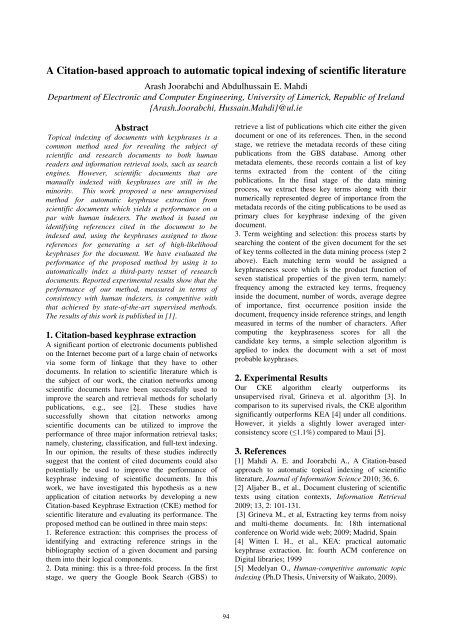NUI Galway – UL Alliance First Annual ENGINEERING AND - ARAN ...
NUI Galway – UL Alliance First Annual ENGINEERING AND - ARAN ...
NUI Galway – UL Alliance First Annual ENGINEERING AND - ARAN ...
You also want an ePaper? Increase the reach of your titles
YUMPU automatically turns print PDFs into web optimized ePapers that Google loves.
A Citation-based approach to automatic topical indexing of scientific literature<br />
Arash Joorabchi and Abdulhussain E. Mahdi<br />
Department of Electronic and Computer Engineering, University of Limerick, Republic of Ireland<br />
{Arash.Joorabchi, Hussain.Mahdi}@ul.ie<br />
Abstract<br />
Topical indexing of documents with keyphrases is a<br />
common method used for revealing the subject of<br />
scientific and research documents to both human<br />
readers and information retrieval tools, such as search<br />
engines. However, scientific documents that are<br />
manually indexed with keyphrases are still in the<br />
minority. This work proposed a new unsupervised<br />
method for automatic keyphrase extraction from<br />
scientific documents which yields a performance on a<br />
par with human indexers. The method is based on<br />
identifying references cited in the document to be<br />
indexed and, using the keyphrases assigned to those<br />
references for generating a set of high-likelihood<br />
keyphrases for the document. We have evaluated the<br />
performance of the proposed method by using it to<br />
automatically index a third-party testset of research<br />
documents. Reported experimental results show that the<br />
performance of our method, measured in terms of<br />
consistency with human indexers, is competitive with<br />
that achieved by state-of-the-art supervised methods.<br />
The results of this work is published in [1].<br />
1. Citation-based keyphrase extraction<br />
A significant portion of electronic documents published<br />
on the Internet become part of a large chain of networks<br />
via some form of linkage that they have to other<br />
documents. In relation to scientific literature which is<br />
the subject of our work, the citation networks among<br />
scientific documents have been successfully used to<br />
improve the search and retrieval methods for scholarly<br />
publications, e.g., see [2]. These studies have<br />
successfully shown that citation networks among<br />
scientific documents can be utilized to improve the<br />
performance of three major information retrieval tasks;<br />
namely, clustering, classification, and full-text indexing.<br />
In our opinion, the results of these studies indirectly<br />
suggest that the content of cited documents could also<br />
potentially be used to improve the performance of<br />
keyphrase indexing of scientific documents. In this<br />
work, we have investigated this hypothesis as a new<br />
application of citation networks by developing a new<br />
Citation-based Keyphrase Extraction (CKE) method for<br />
scientific literature and evaluating its performance. The<br />
proposed method can be outlined in three main steps:<br />
1. Reference extraction: this comprises the process of<br />
identifying and extracting reference strings in the<br />
bibliography section of a given document and parsing<br />
them into their logical components.<br />
2. Data mining: this is a three-fold process. In the first<br />
stage, we query the Google Book Search (GBS) to<br />
94<br />
retrieve a list of publications which cite either the given<br />
document or one of its references. Then, in the second<br />
stage, we retrieve the metadata records of these citing<br />
publications from the GBS database. Among other<br />
metadata elements, these records contain a list of key<br />
terms extracted from the content of the citing<br />
publications. In the final stage of the data mining<br />
process, we extract these key terms along with their<br />
numerically represented degree of importance from the<br />
metadata records of the citing publications to be used as<br />
primary clues for keyphrase indexing of the given<br />
document.<br />
3. Term weighting and selection: this process starts by<br />
searching the content of the given document for the set<br />
of key terms collected in the data mining process (step 2<br />
above). Each matching term would be assigned a<br />
keyphraseness score which is the product function of<br />
seven statistical properties of the given term, namely:<br />
frequency among the extracted key terms, frequency<br />
inside the document, number of words, average degree<br />
of importance, first occurrence position inside the<br />
document, frequency inside reference strings, and length<br />
measured in terms of the number of characters. After<br />
computing the keyphraseness scores for all the<br />
candidate key terms, a simple selection algorithm is<br />
applied to index the document with a set of most<br />
probable keyphrases.<br />
2. Experimental Results<br />
Our CKE algorithm clearly outperforms its<br />
unsupervised rival, Grineva et al. algorithm [3]. In<br />
comparison to its supervised rivals, the CKE algorithm<br />
significantly outperforms KEA [4] under all conditions.<br />
However, it yields a slightly lower averaged interconsistency<br />
score (≤1.1%) compared to Maui [5].<br />
3. References<br />
[1] Mahdi A. E. and Joorabchi A., A Citation-based<br />
approach to automatic topical indexing of scientific<br />
literature, Journal of Information Science 2010; 36, 6.<br />
[2] Aljaber B., et al., Document clustering of scientific<br />
texts using citation contexts, Information Retrieval<br />
2009; 13, 2: 101-131.<br />
[3] Grineva M., et al, Extracting key terms from noisy<br />
and multi-theme documents. In: 18th international<br />
conference on World wide web; 2009; Madrid, Spain<br />
[4] Witten I. H., et al., KEA: practical automatic<br />
keyphrase extraction. In: fourth ACM conference on<br />
Digital libraries; 1999<br />
[5] Medelyan O., Human-competitive automatic topic<br />
indexing (Ph.D Thesis, University of Waikato, 2009).
















